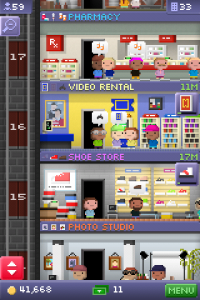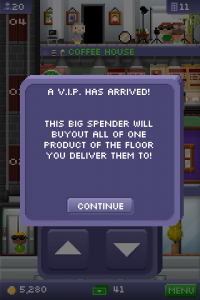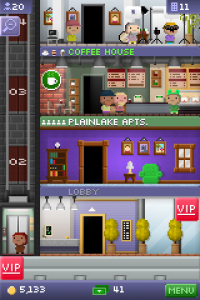
As the iPhone and iPod Touch continue to sell like hotcakes, more and more simple games are being viewed as portable crack. Angry Birds still manages to find millions of people in caves somewhere who haven’t played it yet, while Tiny Wings dive bombs other unsuspecting victims.
One of the newer addictions is Tiny Tower, a "freemium" app that costs nothing to download and plays with the option of paying money to advance in the game quicker. The game seems innocent enough. Pixel-art-styled "bitizens" inhabit a 2D tower that you, the player, are building higher and higher. You want to earn enough money from different types of floors (such as Retail, Service, Food, etc.) in order to build more floors, ad infinitum, in an effort to make a monolith that rivals the Tower of Babel.
Tiny Tower is becoming an epidemic. Several of my peers in the game industry have confessed to a Tiny Tower addiction. When I tried to warn my sister of the game’s danger, I learned that she already had a 20-floor-high tower of her own. When my fiancee is on her iPod Touch, she’s not checking Twitter like a normal person — she’s playing freakin’ Tiny Tower.
And the moral problems start quickly.

You need to build residential floors to entice innocent bitizens to move into your tower. Then you force them into slave labor by making them work for whatever shops you’ve installed throughout the rest of the tower: You charge them rent, they don’t get paid, and they’re forced to take whatever jobs you give them. Granted, you’re encouraged to give them jobs they like — and you get a great bonus for giving bitizens their "dream job" — but it still sends a nasty message to children who may get bad ideas about our wonderful system of capitalism.
But that’s not the worst part. The bigger problem comes in the form of "VIPs," who are special bitizens who can reward you with gameplay bonuses. The Construction Worker, for example, knocks three hours off of the build time for a floor in progress. The Real Estate Agent can move a new bitizen into a residential apartment with room available. Such VIP appearances are random, and you can send them to whatever floor you wish via the game’s elevator.
Two of the problematic VIPs are the Celebrity, who will bring an increased amount of traffic to whatever floor they visit, and the Big Spender, who will buy out the entire stock of one item from whatever floor they’re delivered to.

The issue? This works with any floor and any item. If you send a Celebrity to a men’s fashion store, everyone will want to visit that retailer. That’s fine. Who hasn’t shopped at a particular Men’s Warehouse just because Miley Cyrus bought a suit there?
But what about when a Big Spender invests in thousands of wedding ceremonies at the wedding chapel? What does that teach our children? That if you’re a VIP, it’s OK for you to marry the entire state of Rhode Island if you want to?
Then there’s the pharmacy. I shudder to think how much cold medicine has been put in the hands of a Big Spender who’s almost certainly using it to make meth. And what is in those prescription meds that everyone buys just because the Celebrity is in the drug store?
And do we really want to encourage the ownership of a casino? "Guess what, guys? If you run your slot machines and poker tables right, you can walk away with so much money."
It may be free, but be aware of the demons that lurk in your iOS device if you download Tiny Tower.
What? How high is my tiny tower, you ask? (That’s what she said.) Thirty-five floors and counting; thanks for asking. [Author's note: Since this was originally posted, I'm now at 83 floors. Oh, wait…84.]
Originally published on my personal website.
VentureBeat's mission is to be a digital town square for technical decision-makers to gain knowledge about transformative enterprise technology and transact. Learn More
